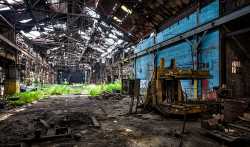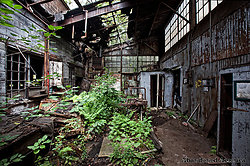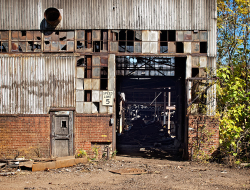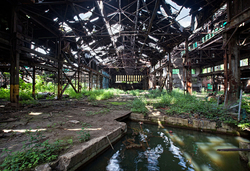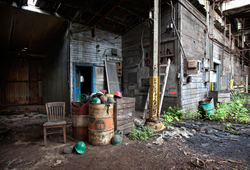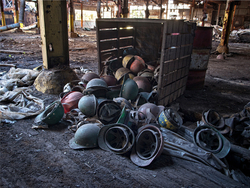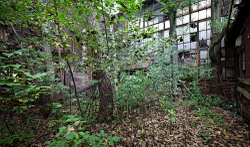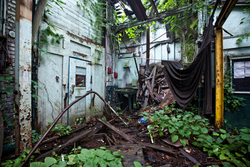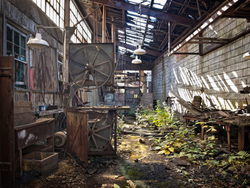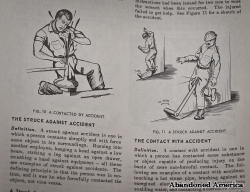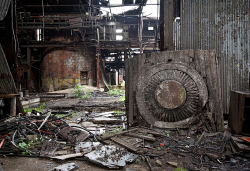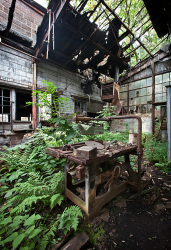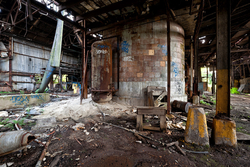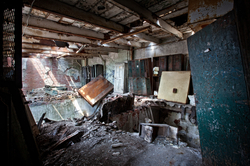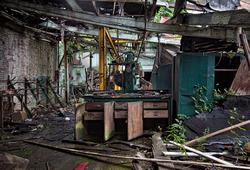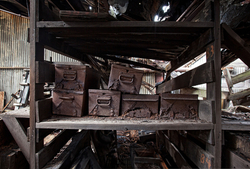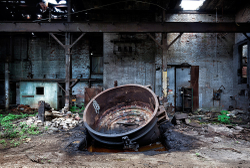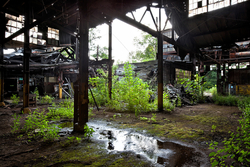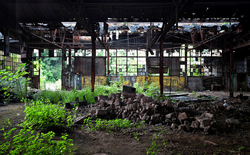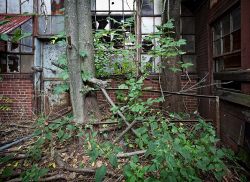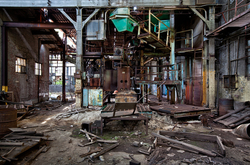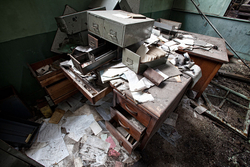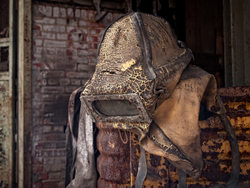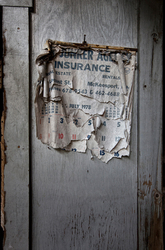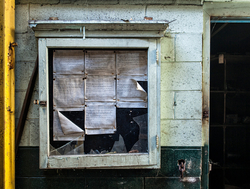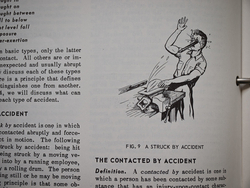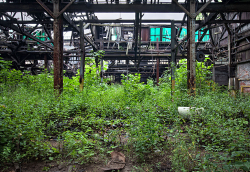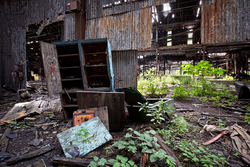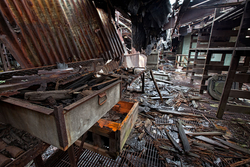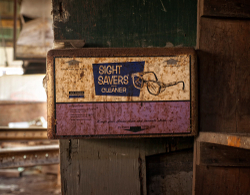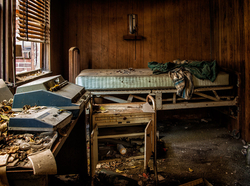Fort Pitt Casting
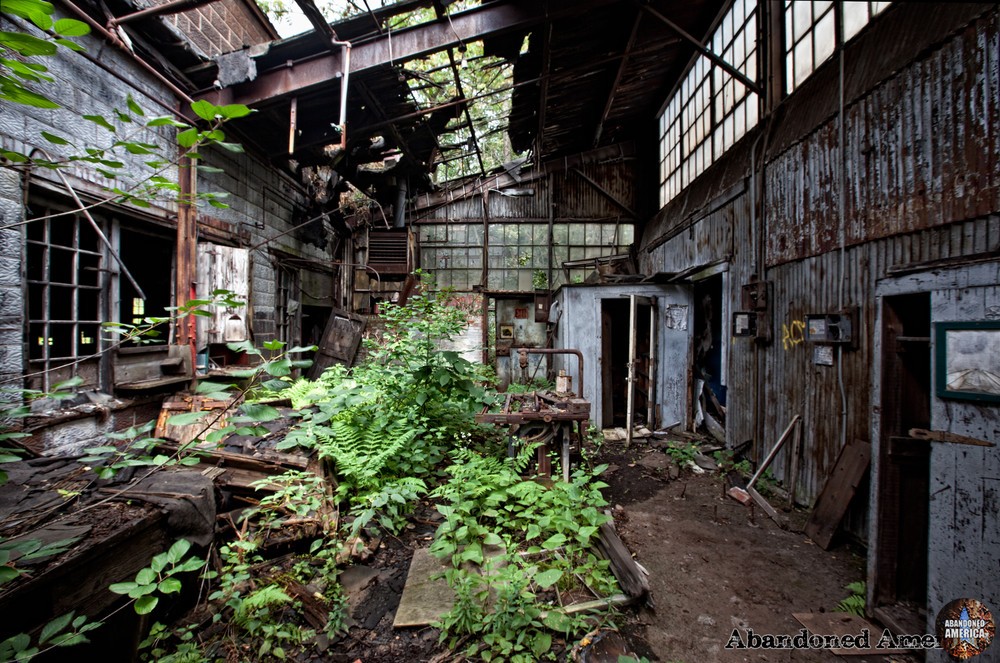
A machine shop transformed into a greenhouse in the abandoned Fort Pitt Casting Company in McKeesport.
Losing a Foundry: Fort Pitt Casting Company
Updated July 5, 2022 | By Matthew Christopher
The last time I visited the Fort Pitt Casting Company was on an overcast afternoon in 2013, less than two years before it would finally be demolished. There was something charged in the air, that odd sense of kinetic energy that precedes a summer storm and gives you goosebumps in expectation of something you aren’t even entirely sure you can define. The former foundry’s long bays had turned to an unplanned arboretum, with weeds running rampant over dusty workshops and remnants of machinery in supersaturated explosions of green that glowed in the light. I had been there years before but something was different this time. The flora was swallowing the place, transforming what had once been a dirty old industrial ruin into a thing of wonder and beauty. Filthy pools of water still remained in the floor, slick with filmy chemicals, but large portions of the ceiling had fallen in and the lines between interior and exterior were blurring in a way that seemed almost rapturous. As peaceful as it was, you would never have imagined the fire it had once contained, both in its operations as a foundry and as a hotbed of labor unrest.
Fort Pitt Casting Company had been founded by C.S. Koch in 1906 - a little over a century before my visit - on 13 acres that would become part of McKeesport, Pennsylvania. The area was ideally located by the railroad, and the proximity to Pittsburgh's other enormous steelmaking industries made it easy and convenient to obtain supplies. Foundrymen would create a pattern for the desired steel or iron product, pack it in wet sand, and pour molten metal into the mold when it dried. Fort Pitt was smaller than many of its competitors but this worked to its advantage, allowing it to adapt quickly and keep costs low. According to Jason Toyger’s fantastic and well-researched history of the plant on Tube City Online, “Fort Pitt made items for industrial customers, like pipe fittings and couplers for boilers and water systems; axle and bearing parts for railroad cars and locomotives; gears, hooks and chains for mines and factories; and pieces for large electric motors and circuit breakers.” They were innovators in their field, and though all 350 workers went on strike in July of 1913, relations between the management and labor were quite good for the time.
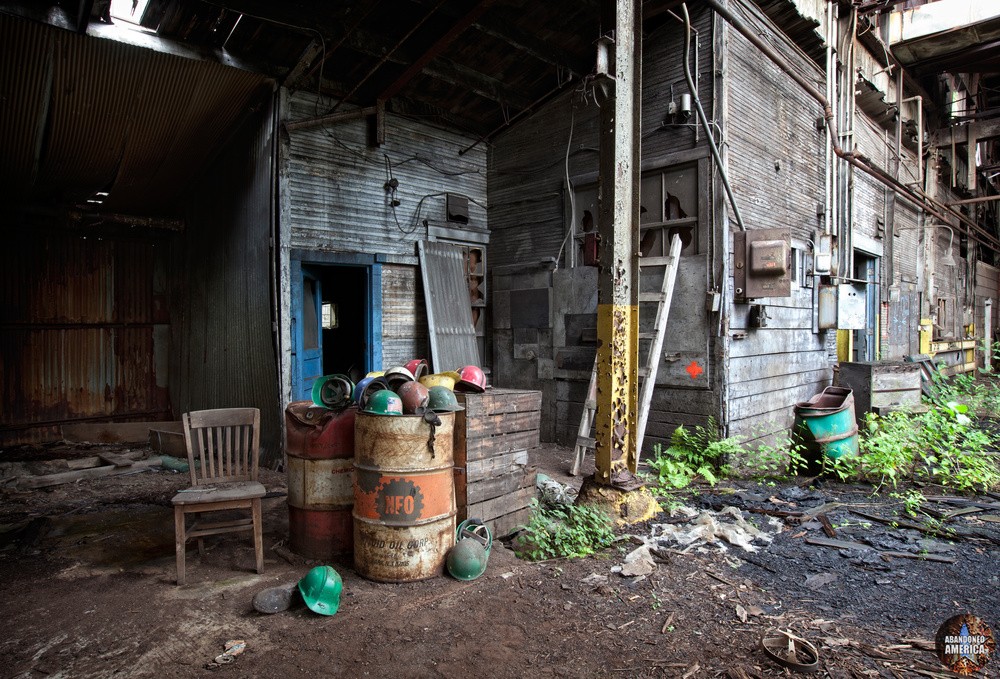
Brightly colored hard hats were a haunting reminder of the jobs lost when Fort Pitt closed.
Things ran relatively smoothly in Fort Pitt’s early days. There was a fatal incident in 1916 where a worker named Michael Paulik was killed by a broken drive belt. His widow's request that her $2,327.09 compensation be paid in a lump sum so she could support herself by buying a house and taking in boarders was refused by the company. She was instead paid weekly so the company could discontinue payments if she remarried. In the late 1930s the employees joined the United Steelworkers union, and Koch died in 1937. As executors of the estate, Union Trust Bank took over managing operations.
Another fatal accident was reported by The Daily Courier in 1942: “James A. Riley, 45, colored, of 210 Second street [sic], West Newton, was killed Monday at the Fort Pitt Steel Casting Company plant in McKeesport when his body was crushed in a sand mill, the Allegheny county coroner’s office reported.”
The lack of information on incidents beyond the accidents involving Paulik and Riley leads one to wonder whether it was the injury rate or disclosure of injuries that was infrequent. Either way, the Maritime Commission presented the company with the prestigious “M” award for excellence in ship building in 1943. They had tripled production capacity to 1,500 tons for the war effort. Representative David Weiss (D-PA) was quoted as saying, “The real success of the Fort Pitt Steel Casting Company can be attributed to the hearty cooperation between management and labor, and the liberal, humane, and understanding management of Fred Grotts, president of the company. He mingles and associates with the men, understands their problems, and is always ready and willing to mediate and conciliate little differences at the counsel table in the good old American method of give and take.”
The camaraderie was short lived. That August the plant was acquired by H.K. Porter Company, and the following January forty three of the welders went on strike, forcing all of the plant’s 1,300 employees to idle for two days. It was the first strike in five years, and both the unions and the company management were against it, but that July three hundred more workers were idled by thirty striking core makers over a delay in approving a back pay plan despite a vote by the union to return to work.
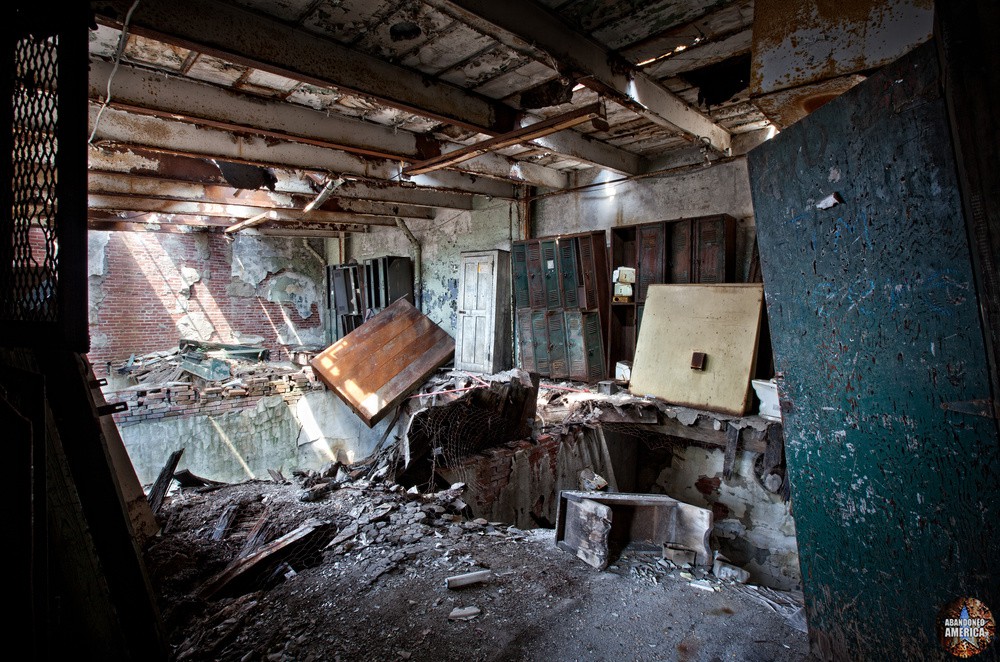
In a crumbling employee locker room at the abandoned Fort Pitt Casting Company, the lockers seem to be hanging onto the wall for dear life.
In 1945 there were more strikes, the first in March. In May a 17-cent increase in hourly pay was turned down, and when the Office of Price Administration delayed an approval of a vacation awarded by the War Labor Board, there was another five day walkout. The Pittsburgh Steel Foundry Corporation (alternately referred to as the Pittsburgh Steel Foundry and Machine Company) purchased Fort Pitt and hoped to continue use of their facilities for production of electric steel products such as small carbon and alloy castings that would compliment the Foundry Corp.’s manufacturing of electric motor frames and locomotive parts. Yet another nine day Fort Pitt strike occurred in 1954 over denial of a raise and pension/insurance improvements.
By 1959, an industrial conglomerate based in Boston purchased Fort Pitt. Textron had originated from a textile company named Specialty Yarns and over the previous decade, and had caused controversy through shady dealings that used charitable trusts to avoid taxes and drive textile manufacturing plants out of New England cities to the southern states and Puerto Rico. Flush with money, according to Toyger, Textron had gone on “a ‘buying spree,’ acquiring automotive, appliance, aerospace and other companies that manufactured everything from ballpoint pens and staplers to chainsaws, plywood, pharmaceuticals, helicopters and golf carts.” Their management was poorly equipped to handle Fort Pitt, strikes continued, and Fort Pitt’s competitive edge vanished as its equipment slowly grew outdated. By the 1970s Textron had sold Fort Pitt to another conglomerate that sold it again shortly thereafter to Condec Corporation, which was collecting small foundries to compliment its own.
It seemed like Condec would be a better fit to manage Fort Pitt than previous owners. They conducted studies on how to improve the plant for the future, moved in equipment from other facilities, and invested in updating production. Nevertheless, the poor relationship between management and labor continued and in 1974 there was yet another six week strike. Condec determined in 1977 that the plant was still outdated, physically deteriorating, and unsafe. Operations were losing about $800,000 annually in the face of overseas competition. It would take an enormous investment to modernize the plant. Decades of resentment finally boiled over in 1978 when a strike dragged on for nine months and both sides refused to budge. Condec decided to close the plant in November of 1978, leaving hundreds of workers unemployed.
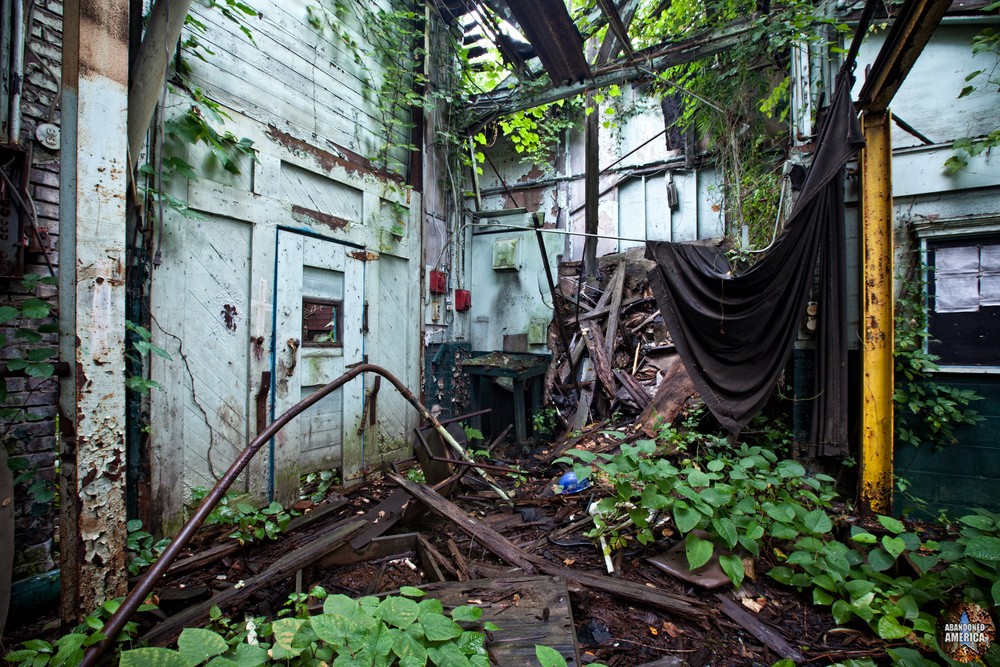
Many of the sections of Fort Pitt were overgrown, giving them a strange mixture of melancholia and beauty.
Less than a year later, a ray of hope emerged. With the help of an investment bank, the former workers planned to purchase and run the facility themselves as McKeesport Steel Castings. Aided by $2.3 million in federal and county loans and an investment from the city of McKeesport, an $8.5 million stock ownership deal was reached. Though many of the former workers were still without jobs, it was hoped that with labor/management difficulties out of the way and a new contract to produce parts for oil companies, operations would expand. “This is an experiment and an adventure” Mayor Lou Washowich was quoted as saying in the Logansport-Pharos Tribune. “There is a crying need for good foundries. I hope and pray you succeed.” In the Indiana Gazette, the new industrial relations manager added: “It’s altogether different now. A few of the ones who got up at our strike meetings and said 'Shut ‘em down, what the hell!’ they call me now and say, ‘You think I’ll get a chance to work?'”
The outdated equipment, poorly maintained plant, and overseas competition proved too much, though, and McKeesport Steel Castings continued to lose money. The company entered bankruptcy in 1983 hoping to restructure but a year later its production was minimal. It was purchased and renamed one more time, but swiftly closed for good when the utilities were shut off due to unpaid bills. McKeesport was already struggling economically and the closure was a tremendous loss from which the area still hasn’t recovered.
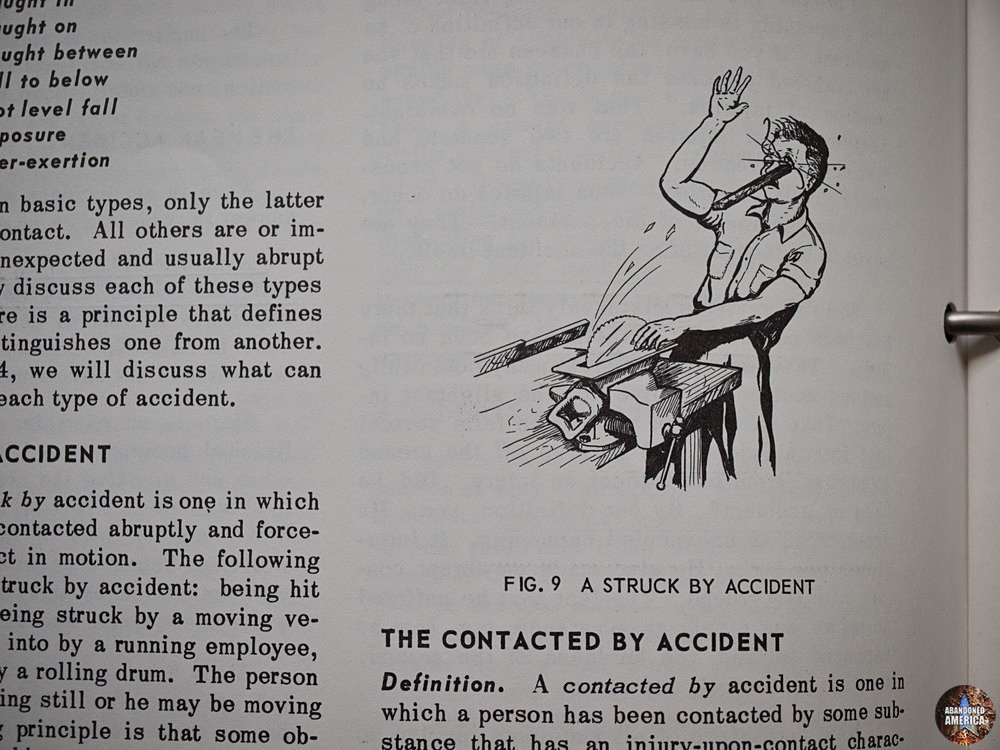
An industrial safety book found at Fort Pitt Casting Company is full of gory illustrations of work accidents that could befall careless employees.
It’s always so hard in retrospect to pinpoint where a bond begins to deteriorate and why. It would be easy to place the blame entirely on the rotating array of managers or fickle, entitled union leaders and workers, but my guess is that simplifying it does both sides an injustice. The objective answers are likely gone forever now, or perhaps they never even existed. Like a marriage that starts with a mutual respect and degenerates over the years into bitterness and resentment, with each side feeling like the other is unreasonable and that their own needs are not being met, the resulting standoffs created vast chasms that ultimately proved too great to bridge. Condec finalized the divorce, but even their own general manager ruefully observed, “Labor and management had an unfortunate relationship, and everybody’s sorry.”
Everyone left with their own losses, perhaps none so severe as the surrounding community of McKeesport itself. Fort Pitt’s incinerator was used briefly in the 1990s - to burn the remnants of abandoned homes in the area, many of which doubtlessly belonged to former workers.
I spent my days at Fort Pitt wandering through the aftermath, through crates still overflowing with colorful hardhats from decades ago and safety manuals filled with gruesome illustrations of the horrible fates that could befall the inattentive worker. The infirmary, where many life-threatening emergencies were surely treated, was filling with leaves, and in a nearby interior courtyard the railings were being engulfed by trees whose trunks were growing around them. I did my best to just observe and document the former foundry as best I could. When the inevitable rains came that final day, I stood for some time just watching the ripples and reflections in the steadily growing pools of water. It was a moment that I knew I had to savor and store away inside of me for the years to come after Fort Pitt was gone. You can’t always explain points in time that are magical, even when they are tinged with deep melancholy. Sometimes you just have to experience them them for what they are.
Fort Pitt Casting is a chapter in my book, Abandoned America: Dismantling the Dream.
Buy a signed copy via this link or get it on Amazon using the link below to read more!
Listen to the new Abandoned America podcast here!
Join us on Patreon for high quality photos, ad-free exclusive content, and book previews
